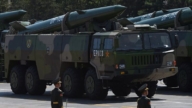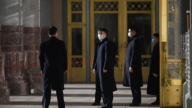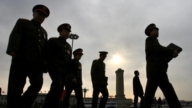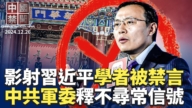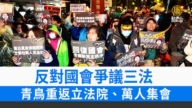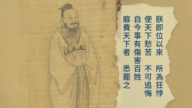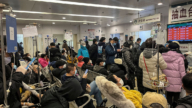【新唐人2012年6月18日讯】美国《财富》杂志日前发表了一篇文章,分析指出,薄熙来下台前,中国有三派人马在争夺下届政府的经济大权。今年年初,“民粹派”代表薄熙来跟“国家主义派”秘密谈判下届政府成员组成时,曾主张清除“改革派”。而分析认为,破除中共的政治和经济垄断,和各个相互交叉的利益集团,才是中国转型和发展的关键。
《财富》文章分析,薄熙来下台前,有三派人马在争夺下届政府的经济大权:
“第一派是以薄熙来为代表的民粹派:他们不顾法治,追求“极端平均主义”的经济政策和重新分配财富,强化政府在经济中的角色。
第二派是国家主义派:他们主张维持现状,由政府集权紧控经济制高点。
第三派是改革派:他们主要以今年2月公布的世界银行报告“中国2030”,作为中国下一步经济改革的蓝图。”
旅美学者程晓农表示,这三派的划分也可以说是三种观点和立场,而“民粹派”多半是左派学者,坐而论道的一些人。
程晓农:“这三派大体上可以说存在,但是他们界限并不那麽分明。也就是说你很难准确的把哪一个人固定的划在哪一派里。因为他是按观点划线的,不是按人划线的。”
杂志文章引述律师界人士的意见表示,任何了解薄熙来的人都知道他是一个只要权力、无视法律的人。曾是中国一家最大汽车厂的最大股东“仰融”,被当时的辽宁省长薄熙来掠夺七亿美元资产后,被迫逃往美国。薄熙来在统治重庆期间,以肃贪和打黑为名,打击他的政敌,民营企业家们也被抹黑成黑社会,并成为他的提款机。
一位了解内幕的人士则透露,年初薄熙来跟“国家主义派”秘密谈判下届政府的轮廓时,曾主张清除“改革派”。
文章还指称,薄熙来的下台,显示,李克强和汪洋为首的“中国经济改革派”正在得势。可能成为下届国家主席的习近平,是否也倾向“改革派”,仍是一个关键问题。但目前,那些对于中国迈向法制漠不关心,只强调重新分配财富并从中谋取私利的薄熙来“新左派民粹主义们”现在处于守势。
据一位海外公司执行总裁(CEO) 说,“经济改革派”正与“国家主义派”争夺对每一个关键经济部门的控制权。这他是在五月中旬与中共高层会晤时提出的。
时政评论人士草庵居士认为,“自由派”们已经看到薄熙来代表的“民粹主义”会导致中国走向“军国主义”的可能,他们想推动政治和经济改革来扭转中国逐渐崩溃的经济状况。
草庵居士:“自由派他们希望中国走向自由化是个好的事情,是应该鼓励的。但是由于在中共统治的这个严厉(环境),自由派还没有足够的力量来推动这个事情。但是我相信,在未来十八大之后的中国的自由派将会逐渐的扩大,自由主义的这种思想还会逐渐的渗透到整个政治和经济各个领域。”
文章最后写道,这场斗争的结果尚不明朗,但对中国的命运举足轻重。最新的数据显示,中国工业生产与出口已出现大幅下降,经济高速增长时代已经过去。
草庵居士表示,由于当前中共在政治和经济的垄断,造成了很多“相互交叉的利益集团”,而这正是中国政治经济改革的一个最大障碍。破除这种垄断和这些既得利益集团是中国转型和发展的关键。
采访/常春 编辑/李明飞 后制/薛莉
Fortune: What China’s Power Struggle Means for its Economy
Recently “Fortune” published an article.
The article pointed out that prior to Bo’s demise there were
three broad factions struggling for power in the next government.
Earlier this year Bo’s “populist” faction was in discussions with
the “statists" over the contours of the next government.
The economic reformers were “going to be the ones left out,"
says one source privy to the negotiations.
Some analysts think that the key to realizing China’s reform
and development is to break the CCP’s political and economic monopoly.
The article from “Fortune” analyzed that
prior to Bo’s demise there were three factions struggling
for the economic power of the next government.
Bo’s populist faction was uninterested in extending the rule
of law and
more interested in “ultra-egalitarian" economic policy aimed
at redistributing wealth and increasing the state’s role in the economy.
Another camp is the “statists" — those who believe in the
status quo, with the government tightly controlling the commanding heights of China’s economy.
The third group is the economic reformers, who laid down
their marker in February with the public release of a
World Bank report called “China 2030″ — a blueprint for
the type of economic reforms the country urgently needs.
Cheng Xiaonong, a visiting scholar in U.S., thinks that
the differentiation of these three factions is based on
three different points of view.
Most members of Bo’s populist faction are leftists.
They like to sit and prattle about the general principles.
Cheng Xiaonong: ”These three factions do exist but
the dividing line is not that clear. In other words,
it’s hard to determine if a person belongs to any of
these three factions.
The differentiation is based on different points of
view not on individual persons.”
A journal article quoted the opinion from lawyers.
Whoever is familiar with Bo Xilai knows that he only
wants power and disregards the law.
Yang Rong was one of the largest stakeholders of
a big automobile factory in China.
When Bo Xilai was governor of Liaoning Province,
he appropriated Yang Rong’s $700 million for himself.
Later Yang Rong was forced to flee to the U.S.
When Bo ruled Chongqing, he attacked his political
opponents in the name of eliminating corruption and cracking down on gangsters.
Private business owners were blackened as gangsters
and turned out to be Bo’s cash machine.
Earlier this year Bo was in discussions with the “statists"
over the contours of the next government.
The economic reformers were “going to be the ones left
out," says one source privy to the negotiations.
The article from “Fortune” also says that Bo’s demise is
a hopeful sign.
It shows that the faction of “economic reformers” led by
Li Keqiang and Wang Yang is now gaining influence.
Whether the man likely to be China’s next President,
Xi Jinping, is also inclined toward reform remains a critical question.
But for now, Bo’s “new left populists," who cared little
about moving China toward the rule of law and
much more about redistributing wealth
(sometimes to their own benefit), are in retreat.
According to a CEO of an overseas company,
the economic reform wing is ascendant,
and is engaged with the statists in a struggle for control
of every key economic ministry.
This CEO had some high-level meetings with
the Chinese government in mid-May.
Commentator Caoan Jushi thinks that “liberals” have
already noticed that Bo’s populist faction will possibly lead China to “militarism".
They want to promote political and economic reforms
to reverse the gradual collapse of the Chinese economy.
Caoan Jushi:”It’s a good thing that liberals hope China
can move towards liberalization.
However, in such a stern political environment ruled by the CCP,
liberals are not powerful enough to drive China’s liberalization.
But I believe China’s liberals will be more and more powerful
after the 18th National Congress.
Liberalism’s ideas will be gradually infiltrated into
the political and economic fields. ”
At the end of the article, it says: “How that struggle will
play out is unclear, but the stakes couldn’t be higher.
As the recent economic data out of China suggest,
the era of unbridled growth may be over.
Industrial production and exports are down sharply.”
Caoan Jushi said, due to the CCP’s political and economic
monopoly, different interest groups are interlaced.
It is the biggest obstacle to implementing political
and economic reforms in China.
The key to realizing China’s reform and development is to
break the CCP’s monopoly and these interlaced interest groups.


